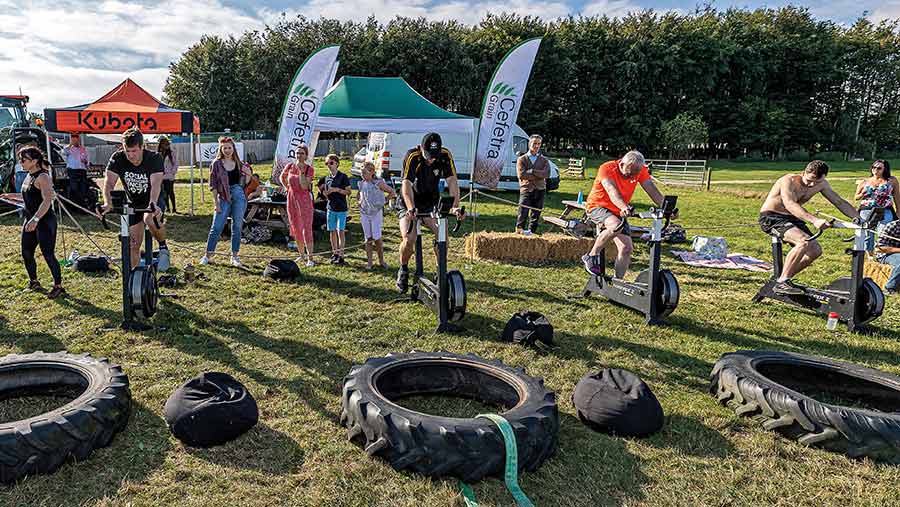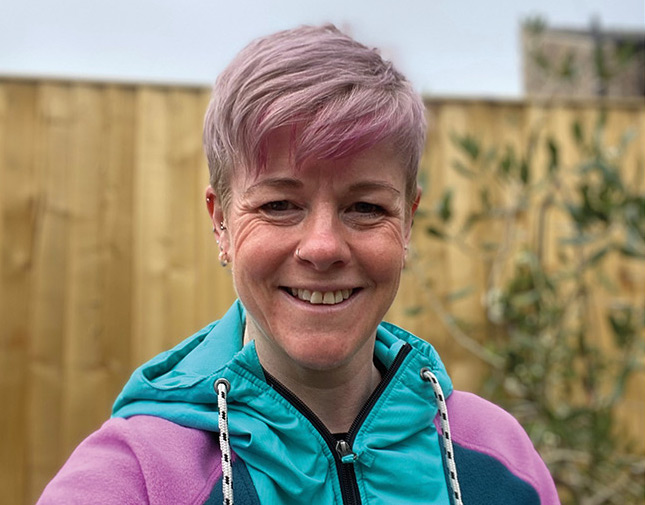Britain’s Fittest Farmer 2022 judge Sally Steadman on mental health
 © Richard Stanton
© Richard Stanton Sally Steadman of the Farming Community Network (FCN) is one of our Britain’s Fittest Farmer judges for the 2022 competition.
We talk to her about how she first came to volunteer for the charity, why depression is such a problem in the farming community, and how she keeps herself mentally fit.
See also: 9 ways farmers can improve their mental and physical health
About Britain’s Fittest Farmer
Now in its fourth year, Britain’s Fittest Farmer is a fun competition organised by Farmers Weekly to get farmers thinking and talking about their physical and mental health.
There is a round of qualifiers and the finals take part at Tom Kemp’s Farm Fitness gym in Essex on 17 September 2022.
There are three categories: men under 40; women under 40; and mixed over 40s.
We’re looking to crown three individuals who prove themselves to be admirable ambassadors of health and wellbeing in farming.
Each winner will receive a coveted trophy and a £1,000 cash prize.
If you’d like to take part, you can apply online at fwi.co.uk/bff
Sally can clearly recall the moment she first heard about the Farming Community Network (FCN).
Her stepdad was experiencing mental health challenges and the farm was becoming too much for him.
“He’d lost his parents in quite quick succession a few years previously, and he and Mum had moved to the farm and taken over,” she says.
“Everything had changed very suddenly. In some ways it was the fallout from that he was feeling a few years later. A family friend suggested we call FCN. We’d never heard of them, but didn’t know what else to do. They were a huge help.”
Her experience of the charity later prompted her to volunteer as a part-time caseworker, alongside her day job, which at the time was a business consultant.

© Sally Steadman
Fresh perspective
“As a woman in my late 20s I hoped I could offer a fresh perspective. I understood that world, spoke the language, still lived in a rural area and had first-hand experience of being around someone with mental health issues.”
As a business consultant, Sally was no stranger to not knowing what to expect when she walked through someone’s door, but admits to being apprehensive during her initial FCN visits.
Her first one was in response to a call from a woman worried about her husband.
“Part of the issue was that everything was new on the next-door farm and he found that difficult because he kept constantly comparing his own situation to that.
“Hard as it is, it’s important to try not to make such comparisons. You only see a snapshot of other people’s lives.
‘A farmer who has all new tractors might also be £1m in debt. Nobody’s life is perfect, and people often put a smile on when they’re in public even if they’re very unhappy.
“At one point that farmer said to me: ‘My dad took his own life, so maybe it’s my turn.’ I’ve never forgotten that.”
Sally spent time with the couple – looking at the business and slowly becoming a trusted confidante. “Eventually, the situation dramatically improved. That was lovely to see.
“It was also about supporting his wife because, at times, she felt like she was merely a passenger watching the situation worsen.”
Nowadays, social media is often blamed for causing a culture of comparison, but farmers have always been prone to this, says Sally, who is the deputy chairman of trustees and chairman of the Yorkshire group of volunteers at FCN.
“One good approach is to try to only compare yourself to how you felt yesterday, rather than to anyone else.
“For as long as people have farmed, they’ve farmed with mental health issues, but it wasn’t as talked about 16 years ago when I started with FCN as it is today.
“People are far more prepared to address the issue now, although picking up the phone to make that first call to an organisation such as FCN is incredibly hard. Nobody wants to admit they’re having a tough time, but it happens to everyone at some point.”
Dealing with depression
Farming can, says Sally, be a lonely job, and this has been exacerbated by Covid.
Layer on other stress-inducing factors such as the uncertainty surrounding Brexit, the disappearance of the Basic Payment Scheme, spiralling fuel costs and the rapid process of digitisation, which makes some people feel left behind, and it’s no surprise many are dealing with depression.
“Farmers also feel constantly criticised by anti-meat campaigners. It’s worth remembering how tiny the vegan movement actually is, though. Cows are also constantly being vilified – unfairly – for causing climate change.
“Farmers need to be aware what others think of them, but it can help to minimise how much of that you read and listen to – whether it’s on the news or social media.”
Issues can present themselves in a whole range of ways, such as increased alcohol consumption and a desire to shut oneself off from the world.
“People might feel high levels of anxiety, but don’t talk about it so it manifests as sleeplessness, ignoring tasks that need doing and taking less enjoyment from the things they previously took pleasure from.”
As a big believer in the interconnectedness of physical and mental health, Sally has always been a keen runner. “Through lockdown one of my greatest pleasures was to go out for a run,” she says.
“It gives me space and time to myself. I like trail running, which means I get to see our wonderful countryside. I completely lose myself in the moment.”
Sponsored runs
She raised £1,500 for FCN through two epic sponsored runs last year – a 30-mile route from Horsham to Brighton in Sussex, then the 62-mile Race to the Stones ultra-marathon over 20 hours from Oxfordshire to Wiltshire.
“It’s a case of mind over matter with ultra-running. Your body is capable of doing it because you’ve trained, but you hit walls. I like taking part because they’re very social.
“It’s a mixture of running and walking so you can chat to people along the way. If you’re having a down moment, there’s always someone to talk to.”
This year she’s planning to do the Hardwolds 40 (which is about 45 miles) between Beverley in East Yorkshire and Malton in North Yorkshire.
“Farmers sometimes think they’re doing exercise all the time, but just because you are outside all day and have an at-times physically demanding job, it’s not the same because your mind is still on the job.
“There’s always a pressing task to be done in farming, but you need to take time for yourself, otherwise the job can consume you. You have to take a break occasionally and step away.”
Sally says the secret is to find a form of exercise that you enjoy and that you can fit into your routine, whether it’s going for a walk or a bike ride or even visiting the beach with the kids. “Some of my friends thing I’m crazy for running, but it works for me.
“I’m also a big advocate of ‘tree bathing’ – a walk in the woods always makes me feel better.”
Some Britain’s Fittest Farmer entrants have even built their own gyms on farm. “Don’t see this as wasted time – it’s time invested in yourself, and looking after yourself means you’ll be there for longer, you’ll be happier and will probably be a better farmer.”
Win £150 with the FarmWell award
Everyone – whether or not they are entering Britain’s Fittest Farmer – can enter the FarmWell Award, run in conjunction with the Farming Community Network, for a chance to win and a £150 Amazon voucher.
Simply send a short, engaging video to farmersweekly@markallengroup.com showing how you stay physically fit and mentally healthy on farm, and how you raise awareness about wellbeing.
FarmWell.org.uk is a one-stop resource created by FCN to help you and your farm business stay strong and resilient through changing times.
It takes a proactive approach in providing guidance for building personal and business resilience, with tips on how to get through stressful situations and what to do in different scenarios.
